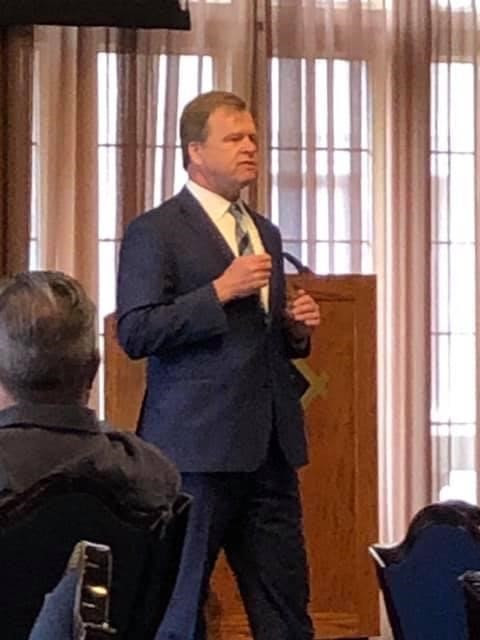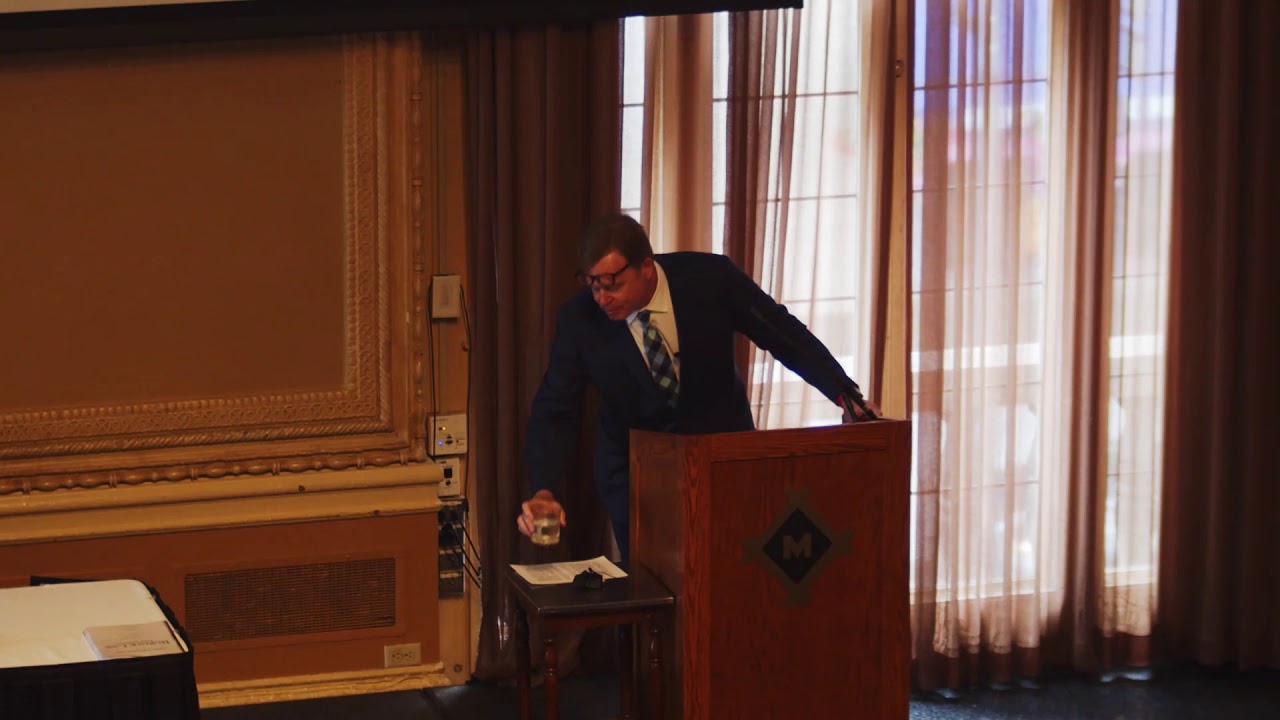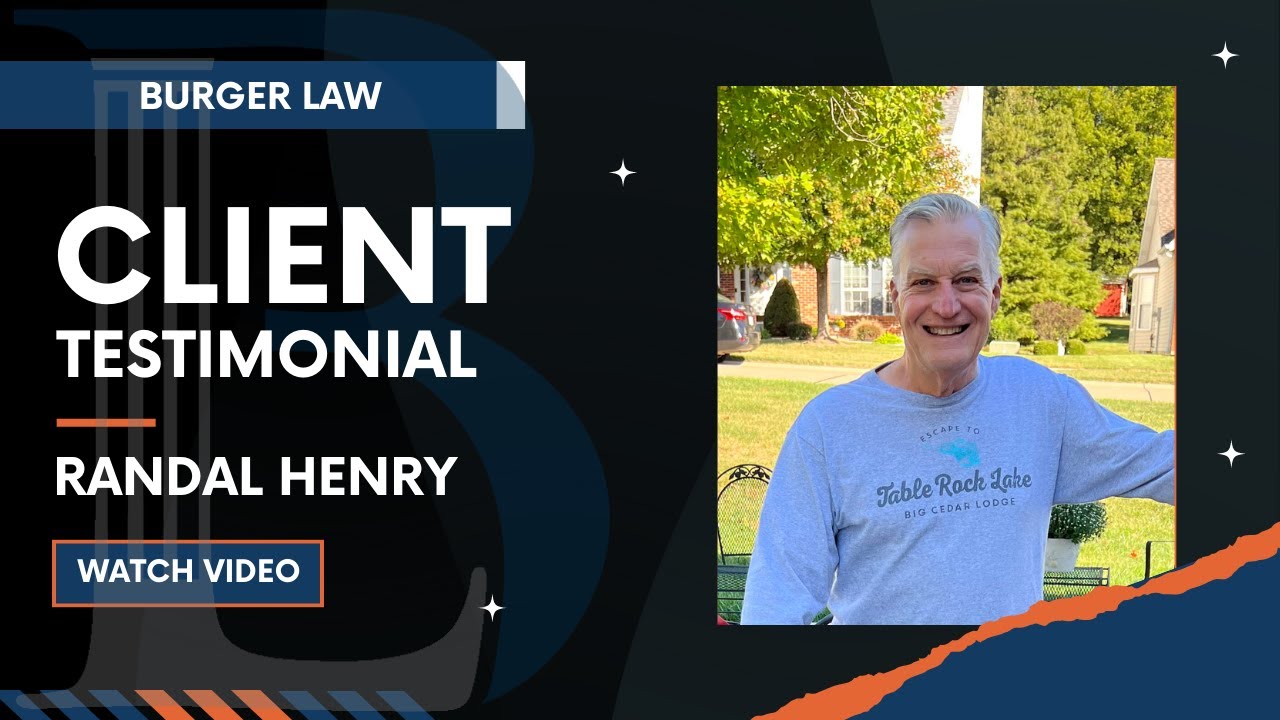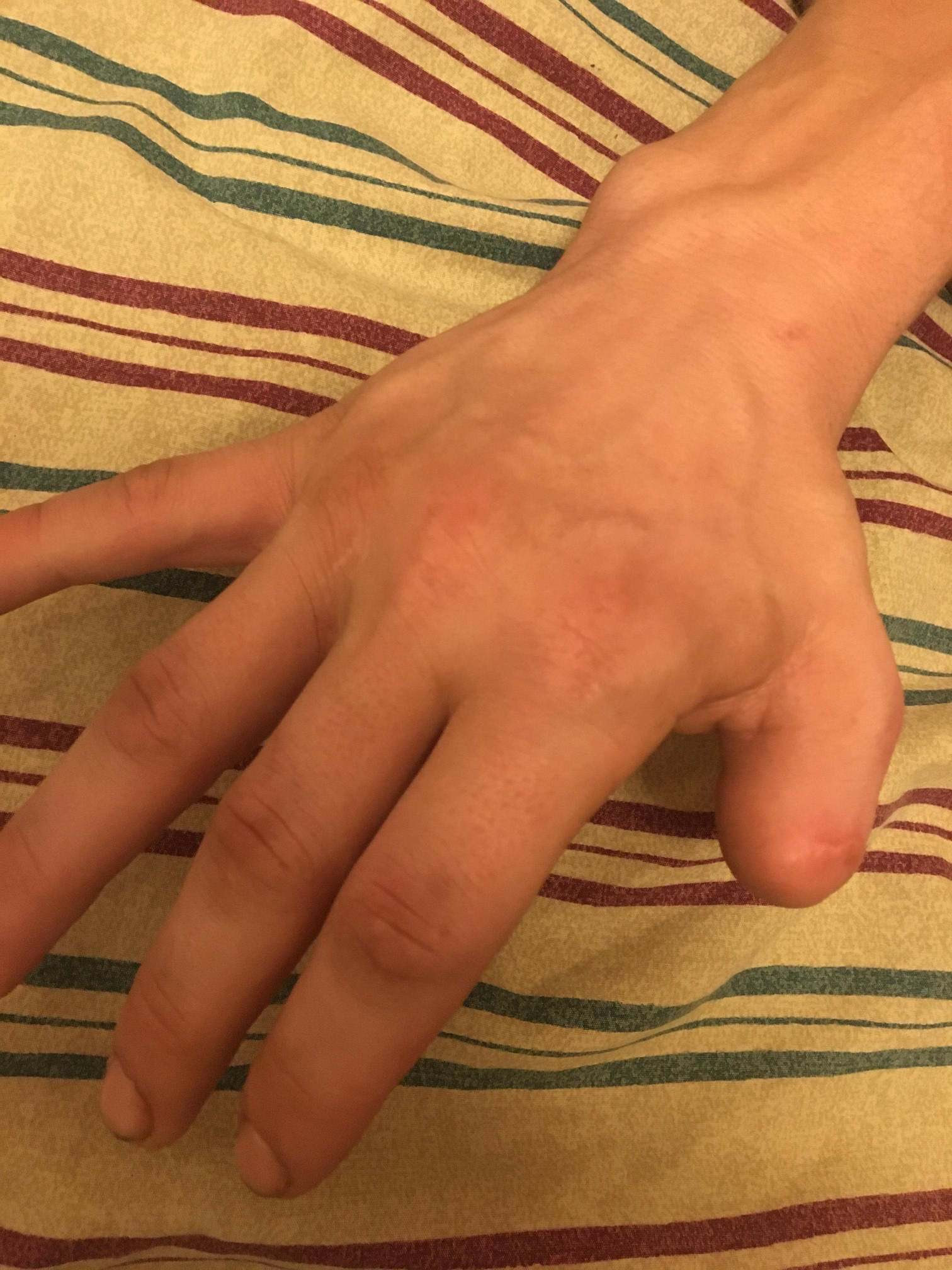Free Consultation
314-542-2222100+ years of combined experience and over $200 million won for our clients in Missouri and Illinois. Contact a personal injury lawyer near you.
Free Consultation
314-542-2222Every personal injury claim is unique, but hearing others' stories can help you understand what to expect. Burger Law offers a new collection of our previous clients' stories and how we were able to help.
Well, I hope it’s been a great year for you and your family. I wish you the absolute best for 2020. For those of you who read these email newsletters (even intermittently), thanks. I truly appreciate being able to share with all the friends of our firm.
I started these newsletters a little over four years ago. I send them every two weeks. I have done 106 of them. In this one, I do my usual recap of the year, by the numbers, share a great Christmas gift my office got me, a video testimonial and a good settlement.
The great news is you will not hear from me again till the next decade.

Cases tried to a jury and won: 3
Cases that were set for trial and settled within a month of trial: 13
Employees: 9 (and me)
Cases argued to Court of Appeals: 2 Decisions: 1 (the other one has been stayed pending the Supreme court weighing in on co-employee claims in on-the-job injuries)
Appellate Briefs written: 2
Appellate cases lost: 0
Burger Law YouTube videos: 329 Click here for our YouTube channel.
Google reviews: 412 Click here to review us.
Lawyer v. Lawyer podcast episodes with Debbie Champion: 58 - Click here for the pods.
Bi-weekly emails sent: 24
Average Number of people who open our bi weekly emails: 2,514
Cases/clients with current open files: 392
New dive cards: 0 :-(
Dives: 47 (way too low – lets change this for 2020)
Cases closed – most settled, a few terminated: 255
Books published on website: 4
Hosted CLEs: 1
Presented CLEs: 3
CLEs MC'd: 1
Additional bee hives: 1 (for a total of 3 – going to 5 next year)
I received the greatest gift from my coworkers at our holiday gift exchange. They always get me great stuff and do a secret Santa among themselves. I got a shark tie, a biking t-shirt, and a book on how to lower my blood pressure (true and funny).
But best of all, they bought a bunch of food and supplies for gateway pet guardians. I have written about them before – they are amazing.
Good to have accountability, so here is last years:
But first, the end of the year is a good time to assess. Here's a great quote by actor Douglas Fairbanks: "In taking stock of ourselves, we should not forget that fear plays a large part in the drama of failure. That is the first thing to be dropped."
To that end, here is Burger Law’s 2018 by the numbers:
Amount awarded in jury verdicts and judgments: $113,714,362
Cases tried to a jury and won: 1
Cases tried to a jury and lost: 1 (very proud of this fight)
Jury verdict average $56,857,181
Cases that were set for trial and settled within a month of trial: 11
Google 5 Star reviews: 373.
Employees: 8
Burger Law YouTube videos: 244
Lawyer v. Lawyer podcasts episodes with Debbie Champion: 30
Bi-weekly emails sent: 24
Average Number of people who open our bi weekly emails: 2,012
Cases/clients with current open files: 314
New dive cards: 2 dive control specialist and assist and instructor
Dives:78 (way too low – lets change this for 2019)
Cases closed – most settled, a few lost or dismissed: 307
Books published on website: 4
Hosted CLEs: 1
Presented CLEs: 4
Scholarships awarded: 1
Appellate Briefs written: 2
Appellate cases lost: 1
Additional kids: 1
Additional bees: 12,000
We have a ton of these on our YouTube channel and website. Here's client Eric King talking about what a great job Genavieve Perino did in his case.
Eric was injured on July 21, 2018, when he was rear ended at a high rate of speed. Mr. Bailey then fled the scene, and did not turn himself in to the police until July 25, 2018, at which time he was given traffic citations for failing to reduce his speed and leaving the scene of an accident that caused damage. Eric had 1 ER visit and less than $2,000 in chiropractic bills – we settled his claim for over $23,000.
We ended the end of the year with some good resolutions in a couple auto cases.
We represented Julie in an auto crash rearender. Although liability seemed clear we couldn't get the insurance company to pay policy limits. She had back and neck treatment after the crash.
Her doctor recommended surgery but she has not had it. She has a history of prior neck and back problems as well and used a chiropractor to maintain her back in her medium labor job. We filed suit, did a policy limit demand and pushed the case. Defendant relented after we showed how the treating doctor was going to testify.
We settled Rich's case for $75,000. The case was referred by a lawyer friend who did a great job and wanted us to push this civil case. We did. We filed suit and limited the claim to $75,000 to prevent removal to federal court.
After litigation and producing Rich for deposition the defendant's insurer paid the top amount we could get. So happy to help this quality person. Great to get to know him.
I trust 2020 has started well for you. It has for me – been busy the last couple weeks.
We decided to take kind of a last-minute New Year’s Trip to Cuba – fascinating country!
I'm announcing the first CLE of 2020 – March 6 at my office building downtown. Defense lawyer Tim McCurdy of Lashly Baer and I are teaming up to teach How to NOT have your experts struck. He and I had a conversation about some recent successes he and I have had in the expert area under the (not so new) Missouri Expert Rules.
We thought they would make a good CLE. If you're a Missouri litigator – come and learn.
Also below is a story from a court appearance last week that got me thinking about consumer debt, the last Lawyervlawyer podcast of 2019. I divided the consumer debt story into two parts – with the second coming in the next email.

Taking a treater's depo and worried about foundation? Naming a bunch of defense experts and wondering if plaintiff's counsel is going to try to strike some of them? Not really sure what you’re going to see in a Motion to Strike or in Limine about your expert right before trial?
Join us on March 6 at 11:00 am to have all your questions answered and your mind put to rest. ;-) Tim McCurdy and I will take you through Advanced Expert Law applied to varied facts, with cases to back us up about disclosure, foundation, reliability, deposition and trial. We will have sample Motions and good written material.
So, I was sitting in Lincoln County court on Tuesday to set an auto crash case for trial.
We represent a client who was hit and needs surgery. We are hopeful to settle the case, but the insurance company will not pay enough so we are setting this case for trial and hope to get a large verdict for him.
But that is not what this story is about. As I was sitting there, an older gentleman and his wife were called up in front of the Court because Bank of America was suing them.
The bank was about to take a default judgment against him and his wife. He had been to Court a number of times on this debt. He could not afford an attorney and could not figure out the paperwork to hire Legal Service of Eastern Missouri.
The Judge advised that he would go ahead and enter a default judgment against him – even though he was right there, which I thought was weird.
So, I asked to approach the bench, mentioned I was a board member of Legal Services and asked if I could help. I met with the man and his wife.
I got the lay of the land from this man and his wife and told them a bunch of things to do to help them with their debt problem. This was the nicest couple - they had not done anything wrong or run up debt improperly. The wife had open heart surgery and medical costs and the husband just did his best to pay the bills. Both were disabled.
I learned that they hired a debt consolidation protection service out of Nevada and paid them every month. But, every time he gets sued by a bank, the company he hired does not do anything and he has to come to Court and represent himself.
He had fought his Sam’s Club credit card company and now he was fighting Bank of America.
The fact that credit card companies, banks, and large finance institutions use our Courts to harass Americans on their debt really disturbs me. I go to court a lot all over this half of the state. I often see Courts bring up many Americans to chastise them about the fact that they cannot pay all their debts and are being sued.
People who get sued by credit card companies or other loan companies have to take time off work, go to Court, get called out in public, sheepishly walk up and get lectured in front of the Court, and feel inadequate and irresponsible.
Credit card companies advertise and solicit these people, they strategically alter the interest rates, try to get you to get a credit card on every college campus and airport, and do aggressive marketing to get customers in the first instance. They don’t care if you can afford the card or know how to spend responsibly.
Our judges and lawyers sit in many courts for many hours every day across the State of Missouri and across the nation having these credit card companies use our court systems to harass Americans and make us feel like crap. It is a disgrace and a national embarrassment.
I have sat through dockets where at least 50 people were called in front of the Court to get judgments against them with another 50 not there and defaulted. They have the threat of a Court Judgment and garnished wages or losing their houses if they do not jump through these hoops. It is demeaning.
Why is it brilliant for a corporation to run up a bunch of debt, or pay money to investors or other entities, and then declare bankruptcy?
Why is our president a smart businessman for having 6 bankruptcies and filing over 3,500 lawsuits?
Why do we let corporations set up a different LLC for every investment they do, allowing them to hide behind the corporate veil? But it’s extremely embarrassing and a scarlet letter of shame, for an individual American to have debt, be unable to pay their bills, or to declare bankruptcy?
The drums of tort reform are being beaten again in the Missouri legislature and other states across the country as legislators open up for business again for the new year. They say personal injury cases are clogging up the Courts and taking our valuable judicial resources.
It is a lie. Credit card companies and debt holders clog up our Courts. In the State of Missouri, approximately 50% of the cases filed are debt collection actions. In Saint Louis, over 100,000 judgments were issued in debt collection lawsuits from 2008 to 2012. Collectively, the individuals who were victims of these lawsuits lost over $50 million in wages through garnishments.
This is not just a St. Louis problem, rather Missouri residents all across the state are harassed by large debt collection agencies. For example, in 2008, a combined 15,321 debt collection actions were filed in Jackson County, St. Charles County, and the City of Saint Louis.
In 2009, 5,621 debt collection actions were filed in the Jackson County Circuit Court, cases in which 95 percent of the defendants did not have an attorney to protect their rights. The reality is, for most courts across the country, debt buyers filed more suits than any other type of plaintiff.
Why do the tort reform advocates try to restrict our access to Courts without restricting the debt collectors’ access to Courts anyway?
In some states you have no fault insurance and you can’t even file a lawsuit for car crashes. States have arbitrary caps and limits on damages without regard to the quantum of damages someone has actually suffered. States also have mandatory arbitration where you do not even have the right to a jury trial for cases.
In Illinois, a fairly democratic/progressive state, there is mandatory arbitration for any injury case under $50,000 and all claims against your own insurance company. I have written about this before. This gives the insurance companies the power to string people along, deny valid claims, delay payment of claims and make people hire lawyers to go through many hoops to get a recovery (after they paid premiums for 20 years to the same insurance company).
Today's email discusses two great settlements on the eve of trial, Part II of my thoughts on consumer debt and some volunteer work our family did at Gateway Pet Guardians.
But first let me plug a great Continuing Legal Education class we are presenting.
Taking a treater's depo and worried about foundation? Naming a bunch of defense experts and wondering if plaintiff's counsel is going to try to strike some of them? Not really sure what you’re going to see in a Motion to Strike or in Limine about your expert right before trial?
Join us on March 6 at 11:00 am to have all your questions answered and your mind put to rest. ;-) Tim McCurdy and I will take you through Advanced Expert Law applied to varied facts, with cases to back us up about disclosure, foundation, reliability, deposition and trial. We will have sample Motions and good written material.
On Saturday, I settled Mary's car crash case against Allstate. We were scheduled to go to trial yesterday. Mary was injured in a 2017 car crash. The offer was $21,000 until about 4:30 on Friday afternoon when Allstate capitulated and paid the $100,000 policy limits.
And yes, I work on Saturdays.
This often happens in my practice. The client and I decide the value of the case and then we keep going until the other side realizes the wisdom of our position. Often, the only power an injured person has is a trial against the wrongdoer's insurance company. We took the medical doctor's depositions by video tape and filed our full pretrial with the court. We argued the motions on Friday and were ready to go. The courthouse closed because of a winter storm and the judge kept the Motion hearing on schedule by doing them from his home on a conference call.
After winning the key motions and insisting on the accurate value of the case we got what Mary deserved.
In the second case, my great coworker Genavieve obtained a $90,000 settlement in a car accident case for her client Jamal where there was only $4,500.00 in medical billing charges. Sometimes, the low cost of medical bills does not reflect the severity of our client’s injuries. Here, Jamal suffered a small labral tear in his right shoulder in a crash that happened like this:
He was treated conservatively with physical therapy and injections. An orthopedic surgeon opined that an arthroscopic surgery would not be unreasonable for him to consider if he continued to have persistent pain and weakness.
However, the surgeon informed Jamal that the recovery process after such a surgery could take up to a year. Jamal works in a job that requires him to use his arm and shoulder. He already missed five weeks of work. Jamal ultimately decided to forego having the surgery, but he might go forward with it in the future.
In a situation like this, where a client has a serious injury but low medical bills, it is extremely important to add value to the case by highlighting other factors. Here, Genavieve emphasized that this was a high-speed collision on the highway, Jamal’s car was totaled, and objective evidence showed a labral tear.
In addition to the $4,500 in medical charges and $4,800 in lost wages already incurred by Jamal, Genavieve estimated the cost of a future arthroscopic labral repair ($27,171.00), anesthesia ($5,424.00), post-surgical physical therapy ($15,572.43), and future lost wages ($4,000 - $20,000). Suddenly, Jamal’s economic damages increased from $9k to ~$60k-$80k.
The policy limits in the case were $100,000. Genavieve sent a bad faith letter pursuant to RSMo. § 573.058, demanding the $100,000 limits.
Insurance companies are often hesitant to consider future medical or future lost wages, claiming they are speculative. But if they don’t consider them, and a jury does, they run the risk of getting an excess judgment at trial.
Likewise, Jamal ran the risk of going to trial with only $9,000.00 in actual damages, being cross-examined about why he had not had the surgery, and a jury disregarding the future medical and future lost wages.
As we approached trial, the insurance company offered $90,000 which we happily accepted.
Last email newsletter I wrote about consumer debt and how our courts are clogged with collection suits by large credit card and debt companies against Americans.
The numbers don’t lie: from January 1, 2008 through December 31, 2012, there were 116,289 judgments handed down in debt collection cases in St. Louis City and County alone.
My proposed solution: implement a debt Court in Missouri.
Rather than having everyone take off work and having to walk hat in hand in the Court to explain why they can’t pay the debt they incurred trying to save their wife’s life, why don’t we have an arbitration Court where they do not have to come to Court or waste a Judge or attorneys time?
Why can’t they just have a telephone conference with a court administrator and the debt collector and resolve these matters with payment plans? Or give them counsel and information so they can figure it out. People do not know what to do about debt problems.
The people I met in Lincoln County had no idea what to do. They were trying to figure out how to handle their debt and had many questions about how and what they should do.
As lawyers and as a Court system we owe a duty to Missouri citizens and Americans to make this debt navigation easier for them.
Bank and credit card companies are some of the most profitable organizations around. In the first half of 2019 alone, Bank of America hauled in $14.7 billion, setting a record for the largest profit ever in just six months. These profit numbers have steadily grown over the years, and will continue to grow. For example, in 2019, the nation’s 5,303 FDIC-insured institutions earned net income of $62.6 billion, an increase of 4.1% from the same time in 2018 and an all-time high.
Additionally, American consumers collectively had $1.08 trillion in credit card debt as of mid-2019, while there were 41 billion U.S. general purpose credit card transactions in 2018.
After meeting with this couple in Court, I got the other side to agree to a 60-day continuance of the hearing on their debt, talked them into getting a hold of Legal Services or me if they are unable to, and gave them advice on how to get into a debt management program.
I also advised them on how to get out of their contract with the Nevada debt consolidation company, long term debt and finance solutions, a way to save their house, and as much advice as I could give them at that time.
Most are not successful in fighting Bank of America. It shouldn’t depend on whether or not a lawyer is going to stand up in Court and help them or not. Thousands or millions of Americans are going to get judgments against them this year and get unfairly taken by these vultures feeding on the poorest Americans.
A debt collection system would more efficiently accommodate debt holders’ rights to collect on their contracts while better protecting debt holders. Consumers could be educated and manage their debt crisis. This would lower the caseload of bankruptcy courts and other institutions designed to address unmanageable debt.
Happy Valentine's Week. Today's email discusses four great opportunities and a big success for my mom, Joan Burger.
First, the Missouri Supreme Court granted transfer to our big verdict on behalf of correction officers, so we get to argue before that august body.
Second, we have an opening at my firm for a good lawyer to join our team.
Third, our Expert CLE March 6 is filling up, so register now – limited seats left. Below I have an article on striking experts based on an argument we had in a case last Friday.
Fourth, the deadline to apply for our firm's scholarship is coming soon so apply now.
Congrats to my mom, Joan Burger, on being given the Fleur De Lis Award by St. Louis University Law School Friday night. She is enshrined in the SLU law school hall of fame. So Proud of her and her amazing and accomplished career.
She is a great mediator working out of USA&M.

Sometimes a defendant wants to have multiple experts at trial. I oppose this practice. Repetitive and cumulative expert testimony is not helpful to a jury - it is unduly prejudicial to call redundant experts at trial to get a numbers advantage. But what's Missouri law say? A circuit court may allow an expert to testify if “scientific, technical or other specialized knowledge will assist the trier of fact to understand the evidence or to determine a fact in issue…” RSMo. § 490.065.
In Shallow v. Follwell, 554 S.W.3d 878 (Mo. banc 2018), the Missouri Supreme Court approved a defendant calling four experts at a medical malpractice trial:1) a doctor in general surgery and critical care medicine to testify about the standard of care; 2) a cardiologist to testify solely in response to plaintiff’s expert; 3) a vascular surgeon, and 4) a colorectal surgeon. Id. at 884.
The Court held the circuit court did not abuse its discretion by admitting the testimony, reasoning, “each one of the experts [has] a different specialty and they all added their own parts.” Id. at 884.
One might argue it was only allowed because all were different specialties. But the Court said:
[The] experts testified about the very root of the matter in controversy; the evidence therefore, was not cumulative. While the expert testimony overlapped at times, the experts testified about their own specialties and offered their own parts....
[T]he overlapping testimony went to the issue of the standard of care and causation—the “very root” of a wrongful death action arising from medical negligence. For this reason, the expert testimony was not cumulative under Missouri law. Further, “Even if evidence is cumulative, that alone is not sufficient to exclude its admission.”
Well then is nothing cumulative? Maybe not, because the court then said:
This does not mean the number of experts who may testify about the very root of the controversy on behalf of a party is limitless and always legally relevant. The probative value of logically relevant collective evidence going to the very root of the controversy must also ‘be weighed against the risks it poses of unfair prejudice.’
If the prejudicial effect substantially outweighs the probative value, the evidence is unfairly prejudicial, not legally relevant, and must be excluded.
Excessive expert witnesses can create the risk the trier of fact will resolve differences in expert witness opinions by the number of experts called instead of giving due consideration to the quality and credibility of each expert opinion.
While expert witnesses testifying about the very root of the controversy have purpose and are not needlessly repetitive, such evidence remains subject to exclusion if the prejudicial effect of the testimony substantially outweighs the probative value. Shallow v. Follwell, 554 S.W.3d at 885.
So, what's the answer? (Drum roll please)
Come to our CLE to find out (Ha).

Taking a treater's depo and worried about foundation? Naming a bunch of defense experts and wondering if plaintiff's counsel is going to try to strike some of them? Not really sure what you’re going to see in a Motion to Strike or in Limine about your expert right before trial?
Join us on March 6 at 11:00 am to have all your questions answered and your mind put to rest. ;-) Tim McCurdy and I will take you through Advanced Expert Law applied to varied facts, with cases to back us up about disclosure, foundation, reliability, deposition and trial. We will have sample Motions and good written material.
Great opportunity at our firm. We are growing and need more good lawyers.
We are excited for lawyers to join our team who:
Salary commensurate with experience. Health insurance and benefits provided.
Please forward your resume, writing sample and references.
Burger Law is dedicated to giving back to the community, and for 2019 we present a new Scholarship Essay Contest! In our previous scholarship competition, we awarded a scholarship to the top entry.
Kate Kouplen from Jenks Oklahoma had a great essay and idea on how to stop texting and driving and won the $1500 scholarship.
The essay question for this year is – How to STOP Bullying.
There’s no easy answer to this problem, but it’s a question deserving of the inquiry. Bullying can have serious and traumatic effects on children and even adults, and it’s never ok nor acceptable. But why does it start? How can an age-old problem be stopped? We’re excited to see what solutions our scholarship candidates can put forth, and what new ideas they have to stop bullying.
Our Expert CLE on March 6 is almost full – so register now – limited seats left.
Speaking of deadlines, our firm's scholarship application time period is ending soon – so apply now. Below, I discuss the CLE and scholarship a bit more, show a client success video, discuss my friend Randy's $250,000 policy limit settlement, lament about how cheap workers' compensation is and highlight an article about a client’s success in last week's Lawyer's Weekly newspaper.

We were recently able to secure a policy limits settlement for our client and friend Randy.
Randy and I became friends many years ago when he painted my house. He is a nice and hardworking man. He later had a crash on his motorcycle in Jefferson County when a motorist pulled out in front of him. The insurance company would not settle and we tried his case in 2012.
We tried the case and won. He was amazing on the stand – insisting he could still paint like he used to before the open rotator cuff surgery he had and said he was pain free. He would not exaggerate even a little, which was absolutely fantastic – the jury loved him.
He worked so hard to get better that I called his physical therapist to the stand who testified he attended 52 of 52 PT visits and was the hardest working patient she ever had. I demanded $140,000 to settle and the jury awarded Randy $142,000. I still have the article framed in my office.
I am lucky to still have Randy as a friend. And more recently, Randy got hurt again.
Randy was rear-ended on I-270, injuring his back and neck.
He saw his primary care doctor, and treated conservatively for four months, but the pain did not go away, it got worse, with shooting pain into his right shoulder. Randy saw an orthopedist and received an MRI that showed multiple disc protrusions in his neck.
A really good surgeon did a microdiscectomy and fusion on his neck, and a follow up surgery was required for further neck and throat issue.
Through all this time, the Burger Law team worked with Randy and aggressively pursued the liable party. After the initial claim adjuster refused to offer the policy limits, we filed suit, and pressed the defendant further, revealing more insurance than was initially disclosed during the discovery process.
I told them I would never take less than policy limits for Randy and they recently relented.
We will put a lot in Randy's pocket with this and will now pursue his underinsured claim. Stay tuned.

Missouri Workers’ Compensation can feel really unfair sometimes – particularly when you cut off your thumb. Unlike a civil claim, with Missouri workers’ compensation claims, you cannot get money for pain and suffering, the value of your claim depends on how much money you make at work, your lost wages may be capped, and a lump sum payment for your injury is limited by an arbitrary “schedule of loss” assigned to each body part by statute.
For example, we recently represented a client whose thumb was sliced off at work:
Pursuant to RSMo. § 287.190, the “schedule of loss” number assigned to a thumb that is completely amputated at the distal joint is 45.
Based on our client’s hourly wage, which is part of the statutory formula, the most he could ever get, even if he lost 100% loss of his thumb is $10,642.50, plus a small amount for disfigurement. This includes the 10% increase in compensation you get for amputations. Doesn’t seem very fair, does it?
We were able to make the argument that the loss of his thumb affected the overall use of his hand. The hand is assigned the number 175. We settled the case for 35% disability of the hand, plus disfigurement, which increased his settlement to $13,500.00. Still not much.
Unfortunately, that is just the reality of Missouri Workers’ Compensation. Sometimes an employee who lost his thumb might have a civil claim too, such as a product liability claim involving a dangerous machine, retaliation against the employer if they are fired because of their injury, or negligence against someone other than his or her employer.
We always investigate whether we can bring these claims to get our clients the most money possible. We are doing this for the poor young man. Stay tuned.

Kate Kouplen from Jenks Oklahoma had a great essay and idea on how to stop texting and driving and won the $1500 scholarship.
The essay question for this year is – How to STOP Bullying.
There’s no easy answer to this problem, but it’s a question deserving of the inquiry. Bullying can have serious and traumatic effects on children and even adults, and it’s never ok nor acceptable. But why does it start? How can an age-old problem be stopped? We’re excited to see what solutions our scholarship candidates can put forth, and what new ideas they have to stop bullying.
NO FEES UNTIL WE WIN YOUR CASE
We offer free consultations and are available 24/7 to take your call. Live chat, text, and virtual meetings are available.
or call us at